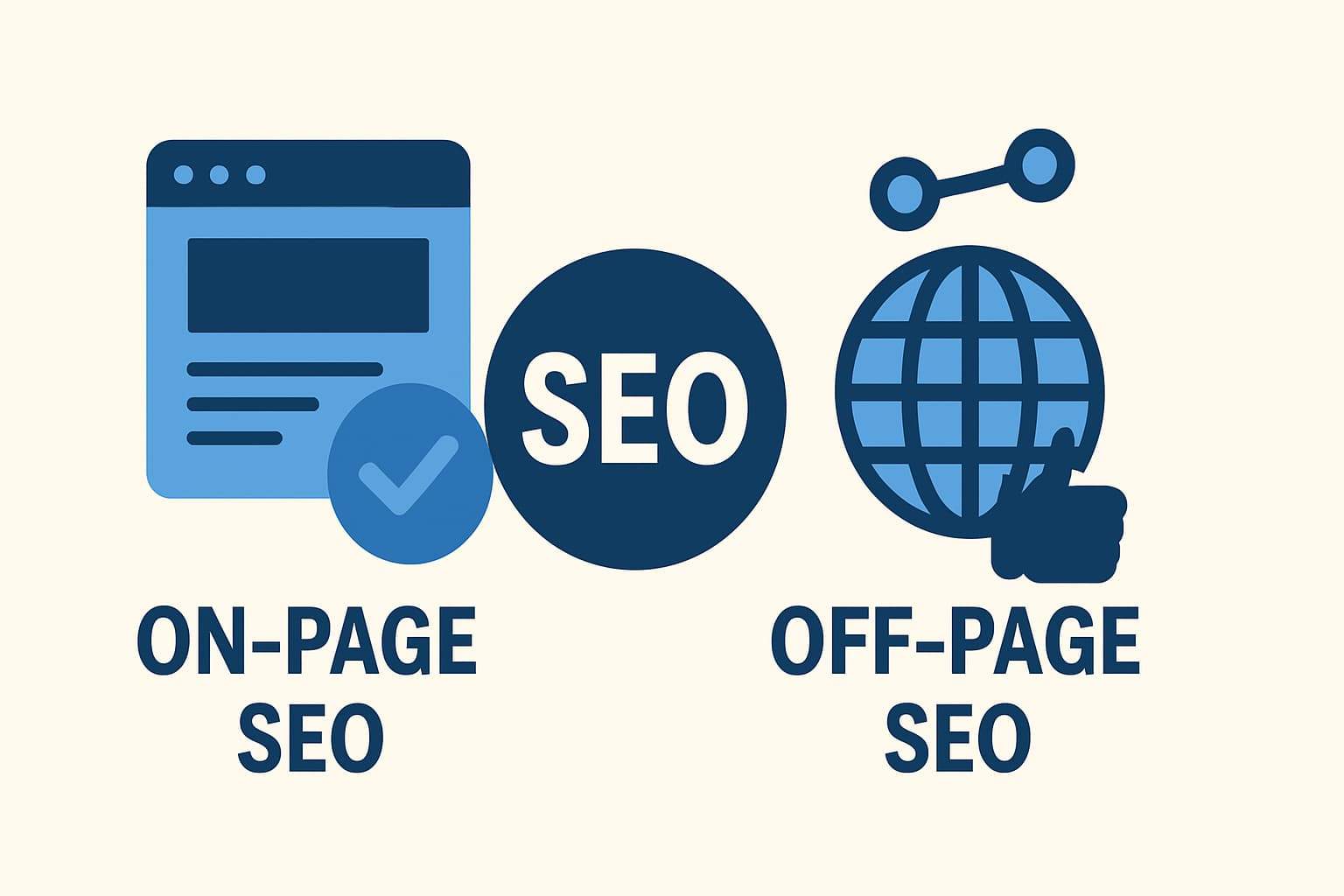On-Page SEO vs. Off-Page SEO: What’s the Difference?

On-Page SEO vs Off-Page SEO? What’s the difference?
When it comes to ranking high on Google, understanding the difference between on-page SEO and off-page SEO is essential.
On-page SEO improves your website’s content, structure, and technical health, while off-page SEO focuses on building authority through backlinks and brand mentions.
According to BrightEdge (2025), over 53% of all website traffic comes from organic search — meaning SEO directly influences visibility and conversions. If you want to dominate search results, you must balance both on-page and off-page strategies.
Table of Contents
What is On-Page SEO?
On-page SEO includes all the elements you can control on your website to help search engines understand your pages better and users have a smoother experience.
Key On-Page SEO Factors
- Optimized content with targeted keywords
- Title tags and meta descriptions
- Clean URL structure
- Image optimization with alt text
- Internal linking and schema markup
- Page speed and mobile responsiveness
Expert Quote: “On-page SEO ensures your website speaks the same language as your audience and search engines.” — Olga Zarr, SEO Expert (SEOSLY.com)
Google uses on-page factors to assess relevance and quality, helping your page rank for the right queries.
What is Off-Page SEO?
Off-page SEO includes all the strategies that take place outside your website to build authority, credibility, and trust.
Key Off-Page SEO Factors
- Backlinks from reputable websites
- Brand mentions and citations
- Guest posting
- Social media shares and engagement
- Online reviews and reputation management
Expert Quote: “Off-page SEO tells Google that other websites trust yours enough to recommend it.” — Brian Dean, Founder of Backlinko
High-quality backlinks act like “votes of confidence,” signaling that your site is trustworthy and valuable.
On-Page vs. Off-Page SEO: A Quick Comparison
| Factor | On-Page SEO | Off-Page SEO |
|---|---|---|
| Control | Fully controlled by you | Influenced by others |
| Focus | Content, UX, and site structure | Authority and reputation |
| Time to See Results | 2–4 weeks | 2–6 months |
| Tools | Yoast, Rank Math, Ahrefs (on-site audit) | Semrush, BuzzSumo, HARO |
| Goal | Optimize for relevance | Build trust and authority |
Expert Quote: “SEO isn’t a choice between on-page and off-page—it’s a partnership between the two.” — Rand Fishkin, Co-founder of Moz
Real-World Data: Why Both Matter
- Pages with strong on-page optimization are 65% more likely to rank in Google’s top 10 results. — (Ahrefs, 2024)
- Websites with high-authority backlinks rank 3.8x higher than those with few or no links. — (Semrush, 2024)
- 68% of online experiences begin with a search engine. — (BrightEdge, 2025)
This data shows that content quality (on-page) and authority (off-page) work hand in hand to achieve consistent SEO performance.
Building a Balanced SEO Strategy
1. Strengthen Your On-Page SEO
- Use a focus keyword in the title, URL, and first 100 words.
- Optimize headings with related terms (LSI keywords).
- Improve readability—short paragraphs, bullet points, and visuals.
- Boost Core Web Vitals (speed, interactivity, stability).
- Update old content to maintain relevance.
2. Boost Your Off-Page SEO
- Earn backlinks from niche-relevant websites.
- Create shareable infographics, videos, and data-driven posts.
- Engage with your audience on platforms like LinkedIn, Reddit, and X.
- List your business in directories (Google Business Profile, Yelp, Bing Places).
- Monitor and disavow spammy links using Google Search Console.
How On-Page and Off-Page SEO Work Together
Think of on-page SEO as your website’s foundation—it defines structure, clarity, and content quality.
Off-page SEO acts like word-of-mouth marketing—it proves that others trust and recommend your brand.
When you optimize for both, Google sees your site as relevant, trustworthy, and authoritative—the three pillars of high-ranking pages.
Common Mistakes to Avoid
- Keyword Stuffing – Overusing keywords harms readability.
- Ignoring Technical SEO – Slow pages reduce engagement and ranking.
- Buying Links – Google penalizes unnatural backlink profiles.
- Neglecting Internal Links – They guide search crawlers and users.
- Skipping Analytics – You can’t improve what you don’t measure.
Conclusion
On-page SEO makes your website discoverable. Off-page SEO makes it credible.
Focusing on one without the other limits your potential.
✅ Your Next Steps:
- Audit your website’s on-page elements using Rank Math or Yoast.
- Start building backlinks with guest posts and outreach campaigns.
- Track results monthly and refine strategies based on analytics.
Want help creating an SEO roadmap? Comment below or share your favorite on-page/off-page tactics — let’s grow smarter together!
Frequently Asked Questions (FAQ)
Which is more important, on-page or off-page SEO?
Both are crucial. On-page SEO ensures your site is optimized for users and search engines, while off-page SEO builds domain authority and trust. You need both for sustainable rankings.
Can I rank without backlinks?
Yes, but only for low-competition keywords. For competitive terms, backlinks are essential for building authority.
What tools help track both types of SEO?
Use Google Analytics, Search Console, Ahrefs, and Semrush to monitor rankings, traffic, and backlinks.


